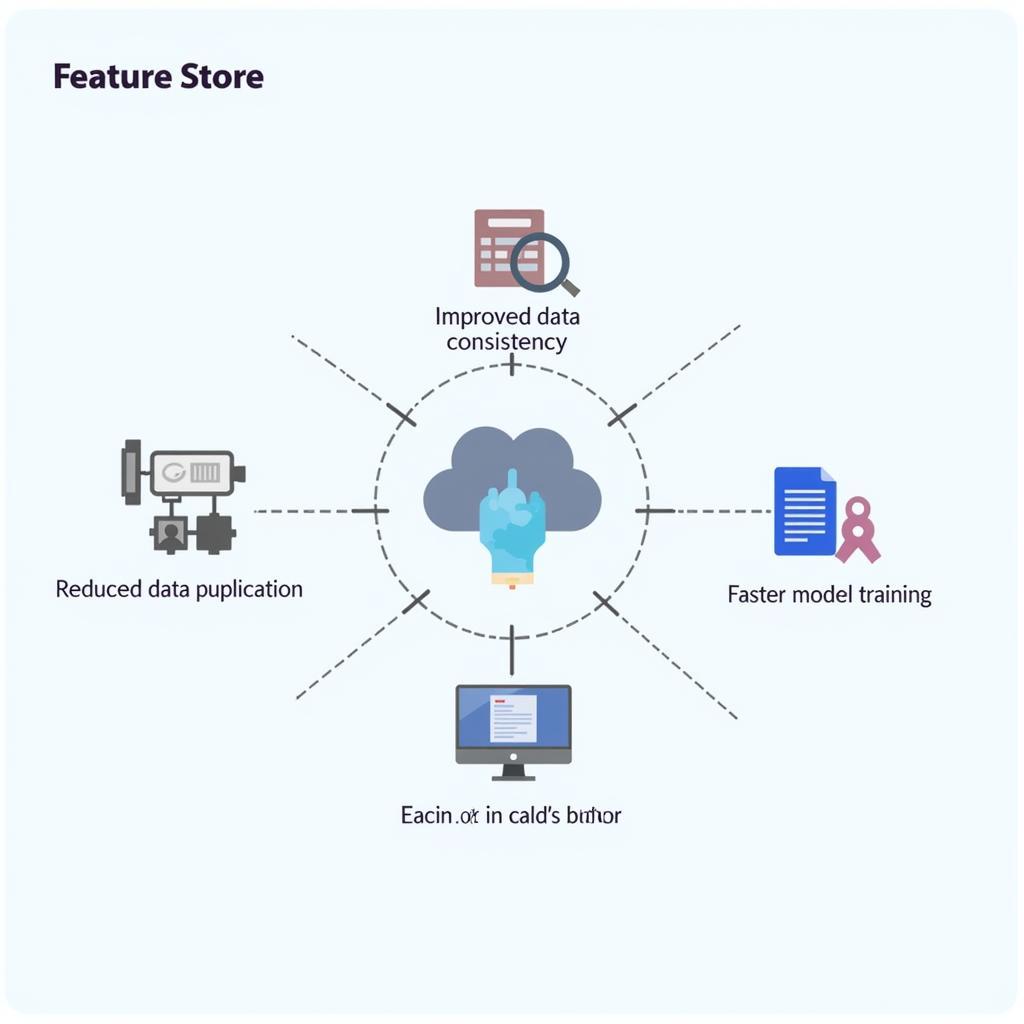A feature store for machine learning is a centralized repository that stores, manages, and serves features for training and deploying machine learning models. It plays a critical role in streamlining the machine learning lifecycle, enhancing model accuracy, and reducing time-to-market for machine learning applications. This article delves into the intricacies of feature stores, exploring their benefits, types, key features, and best practices for implementation.
Understanding Feature Stores in Machine Learning
Before diving into the details, let’s first clarify what features are in the context of machine learning. Features are measurable properties or characteristics of a data point that are used as input to train machine learning models. They could be anything from customer demographics in a marketing campaign prediction model to pixel values in an image recognition system.
A feature store acts as a single source of truth for features, providing a consistent and reliable way to access and use them across different teams and projects. This eliminates the need for data scientists and machine learning engineers to constantly reinvent the wheel by recreating the same features repeatedly for different tasks.
Why Use a Feature Store for Machine Learning?
 Benefits of a Feature Store
Benefits of a Feature Store
Feature stores offer several compelling advantages over traditional approaches to feature engineering and management:
-
Improved Data Consistency: By centralizing feature storage, feature stores ensure that the same features are used consistently across training, validation, and production environments. This consistency is paramount for building reliable and reproducible machine learning models.
-
Reduced Data Duplication: Feature stores eliminate the need for multiple teams to create and store the same features independently, minimizing data duplication and improving data efficiency.
-
Faster Model Training: With features readily available in a prepared and accessible format, feature stores significantly reduce the time required to prepare data for model training, accelerating the model development process.
-
Enhanced Collaboration: Feature stores facilitate collaboration among data scientists and machine learning engineers by providing a shared platform for accessing, sharing, and reusing features.
Types of Feature Stores
Feature stores can be broadly categorized into two main types:
-
Offline Feature Stores: These stores are optimized for batch processing and are typically used for training machine learning models. They provide high throughput for reading and writing large volumes of historical data.
-
Online Feature Stores: Designed for low-latency access, online feature stores are suitable for real-time inference. They allow models in production to retrieve features quickly, enabling real-time predictions.
Some feature stores offer a hybrid approach, combining the capabilities of both offline and online stores to cater to a wider range of use cases.
Key Features of a Feature Store
A comprehensive feature store typically includes the following key features:
-
Feature Registry: A centralized catalog of features, providing metadata, documentation, and lineage information for each feature.
-
Feature Transformation: Tools and libraries for transforming raw data into machine learning-ready features, including data cleaning, normalization, and feature engineering operations.
-
Feature Storage: A scalable and efficient storage system for storing both offline and online features.
-
Feature Serving: Mechanisms for serving features to training and production environments with low latency and high throughput.
-
Feature Monitoring: Tools for monitoring feature quality, identifying data drift, and ensuring feature integrity over time.
Best Practices for Implementing a Feature Store
Successfully implementing a feature store requires careful planning and consideration of several factors:
-
Define Clear Use Cases: Begin by identifying the specific machine learning use cases that the feature store will support. This will help determine the required features and functionalities.
-
Ensure Data Quality: Data quality is crucial for building accurate and reliable models. Implement robust data validation and cleaning processes to ensure the integrity of features stored in the feature store.
-
Choose the Right Tools: Select tools and technologies that align with the organization’s infrastructure, skillset, and budget. Several open-source and commercial feature store solutions are available.
-
Monitor Performance and Costs: Regularly monitor the performance of the feature store and track associated costs to ensure optimal resource utilization and identify potential bottlenecks.
Conclusion
A feature store for machine learning is an invaluable asset for organizations looking to accelerate their machine learning initiatives, improve model accuracy, and foster collaboration. By centralizing feature management, providing consistent data access, and streamlining the model development lifecycle, feature stores empower data scientists and machine learning engineers to focus on building and deploying high-performing models that deliver tangible business value.
FAQs about Feature Stores in Machine Learning
1. What are the benefits of using a feature store?
A feature store offers numerous benefits, including improved data consistency, reduced data duplication, faster model training, enhanced collaboration, and streamlined model deployment.
2. What types of features can be stored in a feature store?
Feature stores can store various types of features, including numerical, categorical, text, image, and time-series data.
3. How does a feature store handle data updates?
Feature stores employ mechanisms to manage data updates and maintain feature consistency. These mechanisms may involve batch processing, streaming updates, or a combination of both.
Need Help with Feature Stores?
Contact us at Phone Number: 0966819687, Email: [email protected], or visit us at 435 Quang Trung, Uông Bí, Quảng Ninh 20000, Vietnam. We have a 24/7 customer support team ready to assist you.
Leave a Reply